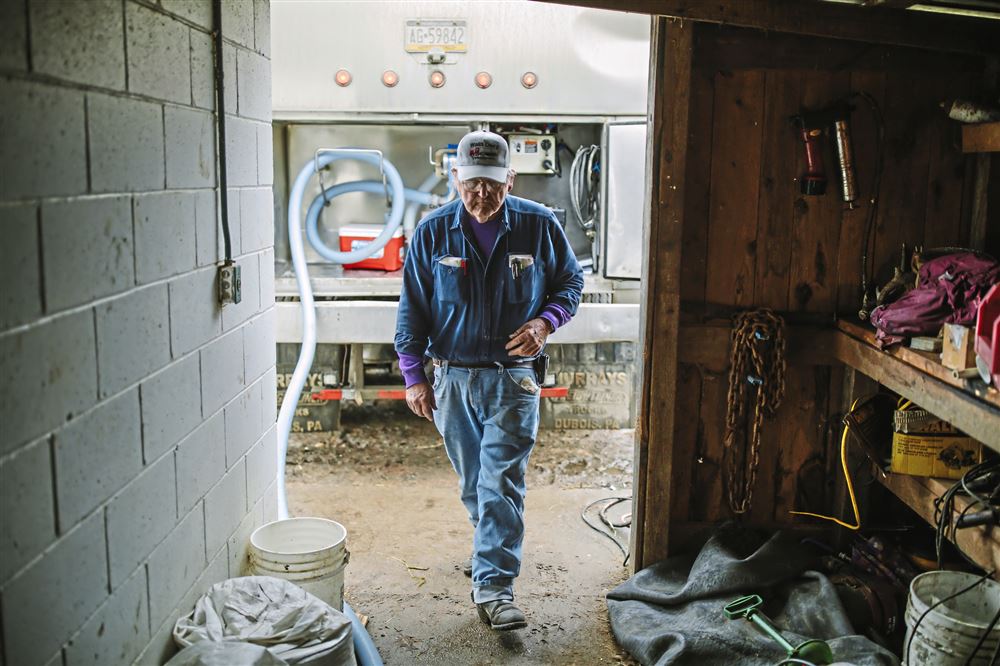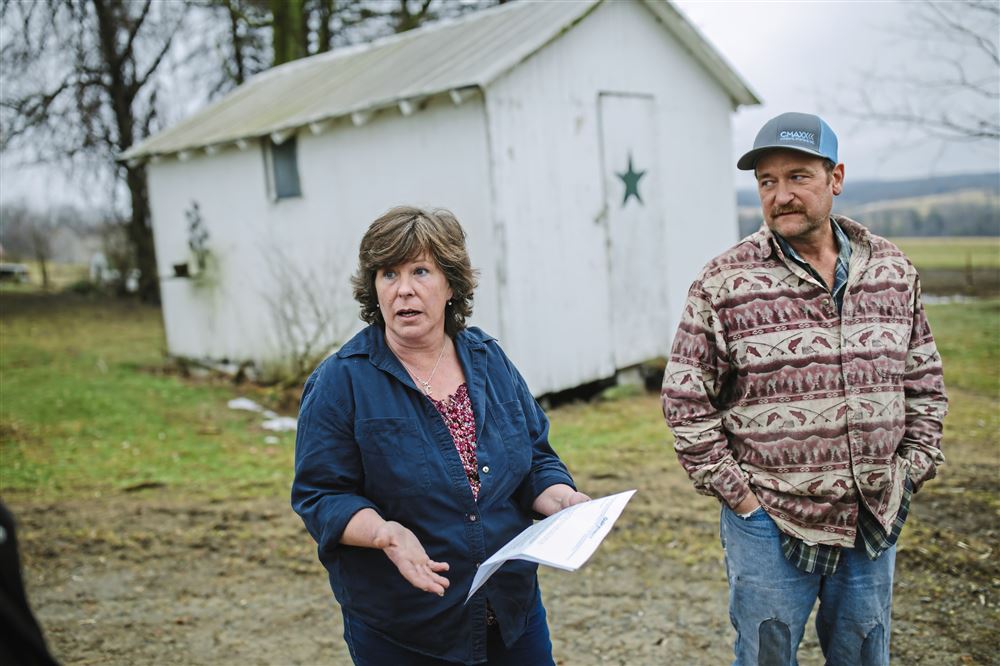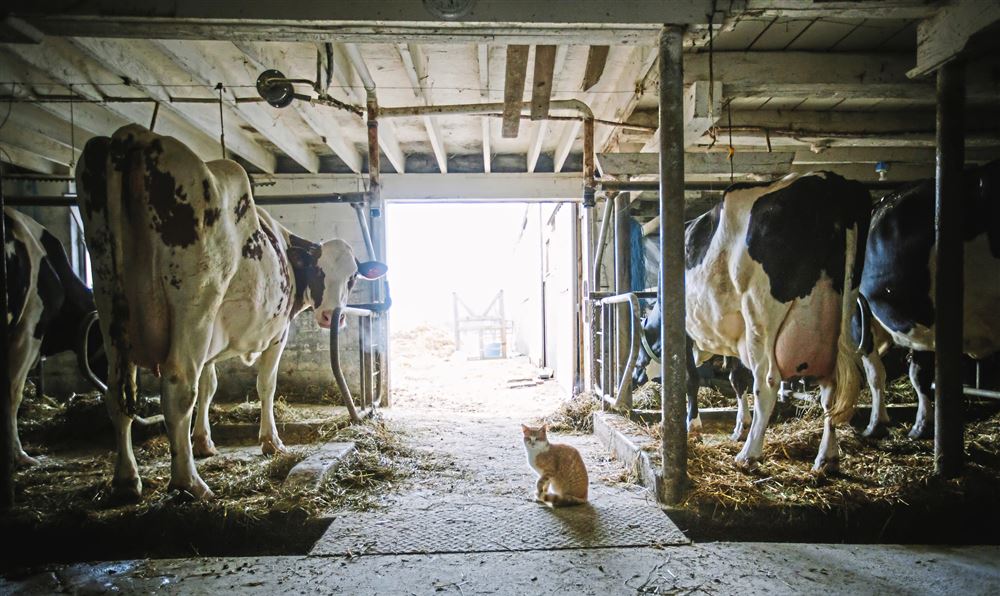On a damp, muddy afternoon last week, Charlie Walls steered a 5,600-gallon refrigerated truck along the bumpy roads of rural northwest Pennsylvania, collecting milk from a route of dairy farms to haul to a processing plant near the Ohio border.
Mr. Walls, a milk hauler in this region for 50 years, could not recall a time when so many of his customers along this route were so distressed. It had come out of nowhere, a certified letter in the mail last month: Dean Foods, the Dallas-based food distribution giant, would stop purchasing their milk on May 31.
Dean Foods’ decision to end contracts with at least 42 Pennsylvania farms — and more than 100 farms in eight states — is the latest blow for the local dairy industry. The move has set off a furious, two-month scramble for small, family-owned farms to find another buyer at a time that the market is flooded with milk and prices have hit rock bottom.
“A cancellation notice like this is almost a termination of the business notice,” said Dave Swartz, assistant director of programs at Pennsylvania State University Extension with a focus on the dairy industry.
“Those farms will have to find a new buyer and right now it’s very questionable whether they can do that,” Mr. Swartz explained. “There’s more milk than what we need in the nation.”

Charlie Walls, 70, operator of Walls Dairy Transport, walks into a barn while milk is pumped into his truck at a farm on March 28 in Mercer, Pa. Walls’ company hauls about 5 million pounds of milk from farms in Clarion and Mercer counties to processing facilities.(Andrew Rush/Post-Gazette)
The market imbalance has squeezed the budgets of dairy farms for the past couple of years.
Prices soared after the Great Recession as other countries demanded more American milk and the dollar was cheaper, driving U.S. exports higher. From 2009 to 2014, the average annual price nearly doubled from $12.83 to $23.97 for a hundred-weight of milk — the standard measurement that amounts to 100 pounds, or about enough to fill a 10-gallon tank.
Since 2014, however, the export market leveled off and dairy alternatives, like almond, coconut and soy, became more popular on grocery store shelves.
In February, the average dairy price in Pennsylvania tumbled to $15.57, about 15 percent below the average price one year earlier, according to a monthly market report from the PennState Extension. The report projected prices to rise slightly later this year but fail to reach a point that allows farms to break even.
This year, Walmart opened its own dairy processing plant near Fort Wayne, Ind., eliminating business for the Dallas-based food distribution company that had previously supplied milk to the retailer.
Without naming Walmart, Dean Foods, in its termination notice to farmers dated Feb. 26, said the retailer’s plant is the main reason it must cease milk purchases.

Cathy Heim holds a cancellation letter she received from Dean Foods with her husband, Jim, at their dairy farm March 28 in Mercer County.(Andrew Rush/Post-Gazette)
“The second reason is bigger than all of us,” the letter read. “The steady increase of raw milk production combined with the decrease of Class I fluid dairy consumption. Quite simply, the diary industry is producing more milk than people are consuming.”
“We know you understand these market conditions all too well,” the letter continued.
Many farmers in northwestern Pennsylvania are looking to Mr. Walls for a lifeline. If a farm doesn’t have a buyer, it’s nearly impossible to stay in business.
Milk purchased by Dean Foods makes up about a quarter of the 5 million pounds that Mr. Walls transports each month. “It’s to my benefit that I find them another buyer,” he said. “I’m doing all I can to find another home for their milk.”
Last week, Mr. Walls, 70, of Emlenton, Venango County, spent four hours driving his route of farms contracted with Dean Foods, passing by fertilizer sellers, farm equipment dealers, feed suppliers, veterinarians. He even crossed paths with a Dean Foods milk inspector. All of them would feel the blow of closing farms.
His first stop was Simon Byler, 28, who with his wife took over a farm of about two dozen cows after his father passed away in 2013.

A cat stands in a barn at the Byler family dairy farm in Mercer, Pa. (Andrew Rush/Post-Gazette)
While Mr. Byler acknowledged he had other opportunities — he could join his brothers in the carpentry and construction trades — selling the farm would come with heartache. A concrete slab by the barn held imprints of tiny hands and initials from young family members.
“You got a little time left,” Mr. Walls said to him. “You’re not up against a wall yet.”
The second stop was a 26-acre farm with 33 cows, purchased four years ago by Levi Lee. Mr. Lee said he poured money into renovating the barn and is in the middle of building a bigger house for his family. If he can’t find another buyer, he said, he’ll likely experiment with sheep or other animals on a small amount of grazing land.
Mr. Walls’ plan at the moment is to press nearby cheese plants to take on more milk. While Americans are drinking less milk, they are eating more cheese.
But even when availability is found, it’s complicated. There are some cheese plants in Ohio that might take milk shipments, but transportation costs would rise and Mr. Walls would have to hike his bills. “I can’t do that to them,” he said.
So far, at least one distributor has agreed to pick up some Dean Foods contracts when they expire.
Schneider Dairy, based in the South Hills, will take milk from four farms in Clarion and Venango counties after a branch manager for the company heard about the trouble at a church service.
“At the end of the day, these farmers were going to lose everything,” said Justin Schneider, the company’s marketing and new business development manager. “We didn’t really need the milk … We kind of felt a duty to do something and to do the right thing.”
Most other farmers feel they are running out of luck.
At another of Mr. Walls’ stops last week, Jim and Cathy Heim had a tone of resignation. The fifth-generation farmers have been contracted with Dean Foods for 20 years, and none of their children are interested in taking over the farm.
“We’re probably going to hang up our hats,” Mr. Heim said.
Source: post-gazette.com









